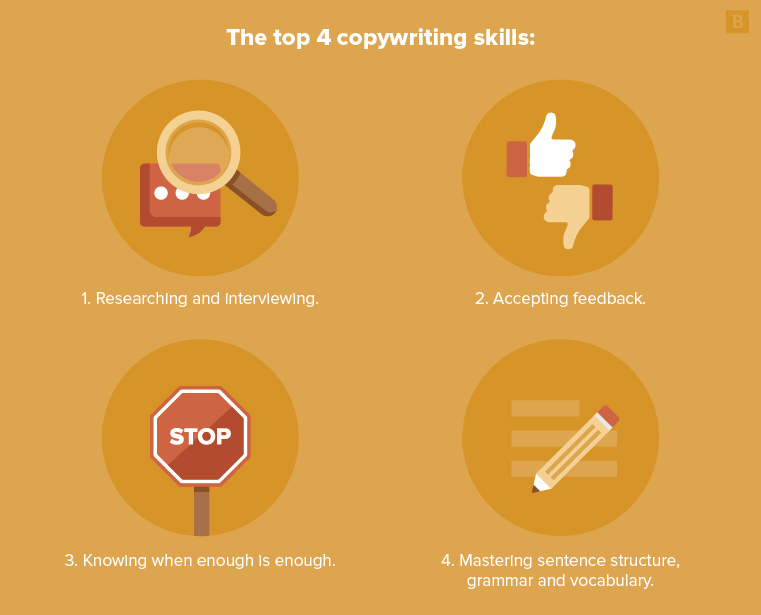Time for a pop quiz: What do the following phrases have in common?
- “I’m lovin’ it.”
- “Just do it.”
- “The ultimate driving machine.”
If you guessed that all of them rank among the best-known advertising slogans in the world — for fast food, athletic gear and high-end German automobiles, respectively — you’d be correct.
But that’s just the easy answer. These three quotes are similar in a few additional ways.
They’re all easy to recall and recognize. They all convey a unique aspect of their brands in one way or another. Even the longest of the three taglines still works as a social media hashtag. And while each one might not instantly convince you to buy a cheeseburger, Jayson Tatum’s latest “Old School” sneakers or a brand new sedan right on the spot, they stick in your mind as essential tenets of those brands’ identities. And eventually, that can motivate someone to make a purchase.
What’s their other major common characteristic? They were all written by dedicated copywriters or other creatives with strong writing skills.
These aren’t the only industries that have utilized the power of the pen to sell products. Every brand needs to have captivating copy that hooks curious prospects and reels in new customers. That’s where the importance of copywriters comes into play: These creative professionals are most often the ones behind the catchy taglines and informative articles you’ll find describing a product or company.
So what does it take to be such a stellar and successful copywriter? In this article, we’ll closely examine the characteristics that make up a skilled copywriter, but the short version is this: You need to be most effective in the following areas:
- Researching and interviewing.
- Accepting feedback.
- Knowing when enough is enough.
- Mastering sentence structure, grammar and vocabulary.
Before we get into the meat of this topic, let’s go over the basics.

What Is “Copy”?
No, we’re not talking about duplicates here. In advertising and marketing, copy refers to the text that fills your landing pages and blog posts, as well as the scripts for your customer testimonial videos, infographics and other marketing material. These assets, among others, are what copywriters produce.
All companies need copy to explain their businesses to prospective customers, persuade people to follow them on social media channels like Facebook, X (the new moniker of Twitter) or LinkedIn, sign up for their newsletters or make purchases. Without copy, customers may have no idea that the perfect solution to their problem is out there, waiting for them to find it.
But is copy the same as content? We’ll get into the differences between copywriting and content marketing a little bit later, but let’s cover the gist of it.
- Copy is considered the written communication used to persuade an audience to take an action, or to motivate brand awareness.
- Content is the information communicated to a target audience using some form of media.
- While copy is always written content, content isn’t always written copy. Content can also come in the form of video, infographics, podcasts or more.
Subscribe to
The Content Marketer
Get weekly insights, advice and opinions about all things digital marketing.
Thank you for subscribing to The Content Marketer!
What Does a Copywriter Do?
If you’re going by the Merriam-Webster definition, a copywriter is simply a person who writes advertising or promotional material.
In reality, a copywriter does much more than simply write ad copy. An effective copywriter must also be a dedicated researcher, a quick learner, a detailed editor and a nimble rewriter.
A good copywriter is a chameleon, able to embody and express one client’s branding for a short period of time, then change colors to match the voice of another’s. This person has the ability to create effective copy, persuasive copy and everything in between.

What Skills Do Copywriters Need?
Full-time and freelance copywriter job descriptions are both often filled with qualifications like “creative,” “motivated” or “collaborative.” While these are all advisable skills to acquire, they’re not exactly specific to copywriting or clearly descriptive of what this branch of content marketing will require.
If you want to truly excel at copywriting, begin by developing these four skills:
1. Researching and Interviewing
Excellent research skills are essential to effective copywriting for 2 main reasons. In the first place, research gives writers a better understanding of the subject they’re covering: the industry’s opportunities and challenges, as well as customers’ needs and problems. In the second place, it helps them identify the best topics and decide what to write about.
While a seasoned writer may be able to conduct thorough research and craft a comprehensive piece of content in just a couple of hours, certain tools can help both senior and junior writers create content in a shorter time.
- For instance, the content generation tool GrowthBar speeds up writing processes by generating content outlines for blogs and websites, among other deliverables.
- Then there are the various large language machine learning models typically referred to as “generative AI”: ChatGPT, Claude, Bard and others. These tools can accomplish functions similar to GrowthBar, potentially from a wider range of training data.
- That said, none of these tools should be considered substitutes for good copywriters. There’s a certain stiltedness that reasonably internet-savvy readers will likely detect in any artificially generated blog article, social media post or other written digital marketing asset. As of now, it’s impossible to guess when any AI or ML model will capably create the compelling copy that a professional copy and content writer can.
2. Ability To Accept Feedback
Not every piece of content will hit the mark. Copywriters will get feedback from peers, editors and clients. They’ll need to edit, adjust, delete and rewrite. Good copywriters don’t get discouraged during this process. They make changes to their content and learn from the experience.
Good copywriters also understand the importance of this procedure. Certain industries are hard to understand, and there may be some growing pains as writers figure out how to speak to the right audience or describe a certain product or service. The learning process may be extensive and difficult, but in the end, it’ll help them create content that’s actually meaningful and useful.
3. Knowing When Enough is Enough
Writers are driven people, and the destination they’re driving toward is perfection. But the road to perfection is an endless one. A good copywriter could go on researching all day, but unless they stop Googling and start writing, they’ll never produce a single piece of copy.
The same goes for the actual writing process. At the end of a piece, you could go back and find countless things to tweak, twist and fine-tune. But at some point, you need to decide that your work is effective enough and send it off to your client, boss or website. An almost-perfect published article is more effective than a continual work in progress that never reaches a single reader.
Last but not least, brevity is sometimes crucial to the quality of copy itself. Social is a perfect example: While not every channel has the character limits of X/Twitter (paid version notwithstanding), posts for sites like Facebook and LinkedIn need to at least begin with concise, gripping statements that make feed-scrollers stop in their tracks and keep reading. If Instagram is a valuable social channel for your digital marketing, you can load posts up with hashtags to boost searchability, but the caption copy should arrest the attention of app users with well-chosen, impactful words.
4. Sentence Structure, Grammar and Vocabulary
To say a good copywriter needs to be a good writer might sound like an obvious addition to this list, but it’s worth pointing out nonetheless.
Strong communication is another overarching essential copywriting skill, along with certain technical skills: most notably, proficiency with word processing and content management apps. Critical thinking that enables you to examine a subject from multiple angles without getting off track will improve (and, ideally, accelerate) problem-solving. Lastly, interpersonal skills are necessary for collaborating with your team and communicating effectively with clients.
At the end of the day, your writing skills are the top priority. Bad writing comes across like shrill, screechy speech. If your voice-over actor shows up to record a commercial with a cold, would you let his raspy, sniffly intonations pollute your message? No; you would give him a lozenge, reschedule the recording or find a stand-in.
You must carefully hone your grammatical, structural and creative abilities to prevent your writing from becoming dull. Sound writing skills need to be apparent throughout each piece, beginning with a headline that makes people want to explore the article, a captivating lead that pulls the viewer in and skimmable subheadings that give rushed readers a good idea of what your main points are.
Strong writing is readable and approachable. There aren’t distractions like misplaced punctuation marks or misused buzzwords cluttering it up. A good copywriter will also have the vocabulary to connect with an audience and the compositional know-how to guide a reader through an article.

Is ‘Copywriting’ the Same As ‘Content Marketing’?
Just like copy isn’t content, copywriting isn’t content marketing.
Good copywriting is essential to building out your website and creating valuable landing pages that inform current or prospective customers. But it’s just not the same as content marketing.
Content marketing aims to inform consumers. Content marketing encompasses all of the blog articles, social media posts, case studies, white papers, infographics and informative video scripts that live on your website. Assets created for this purpose can be compelling, but that’s not because the writer is using complex literary techniques or appeals to emotion.
If, after a prospective customer reads a blog post or watches a how-to video, they decide to invest in a company’s product or services, that’s all the better. But that’s not the sole point of content marketing. While this type of marketing functions in part to help encourage sales, that’s just a secondary goal to its leading intention, which is to educate and inform. Consumers may be convinced to make a purchase because the writer is able to make an honest case for a company’s products or services.
Copywriting, on the other hand, has one primary goal — usually to sell something. Sometimes, the goal is to convince someone to sign up for a newsletter or register for an event. Invariably, though, copywriting has a predetermined desired end result.
Where copywriting is persuasive or instructive, content marketing is helpful and friendly.
How Does Copywriting Fit Into an Overall Marketing Program?
If copywriting and content marketing are so different, how do they fit into the same marketing puzzle?
The 2 concepts rely upon each other to be truly effective. Copywriting can be convincing, yes, but no one wants to be sold to constantly. People need a break from the constant urging to “Sign Up Today!” or “Make a Purchase Now!”
Today’s customers are smarter and more informed than they have been in the past. They want to be able to make up their minds on their own to subscribe, purchase or take another action. In short, customers want to be confident that they’re making the right purchase for themselves.
Content marketing helps customers come to their own conclusions. Informative, truthful articles and blog posts help them develop their knowledge base about whatever product or service they’re shopping for. Its messaging should also align with other areas of your marketing campaign — particularly social media, as social channels are among the most effective ways to increase the reach of marketing content, copy-centric or otherwise. Furthermore, content marketing helps position your company as an expert in its industry and strengthen trust between your brand and your customer.
But businesses can’t survive on trust and goodwill alone. In the end, you need to make a sale, and good copywriting helps to nudge customers in that direction.
How does it do this?
Through well-written, compelling content.
How Do You Modify Your Writing for a Specific Audience?
A singular piece of content won’t appeal to everyone. Brands must tailor their content to the audience they want to capture. This is done through intentional writing that addresses customers’ unique needs.
1. Get To Know Your Audience
The first step in modifying your writing for a particular audience is to use research to determine what those people want to know. This can be done in many ways, for example:
- Email feedback surveys to new customers.
- Ask sales teams about the most common questions prospects have.
- Invite social media followers to fill out a short questionnaire.
As you gather information, you can begin to visualize who your average reader or customer is. With this insight, you can move on to the second step: building out audience personas.
Step 2: Create Personas
Say you’re a provider of environmentally efficient industrial lighting solutions trying to figure out who’s really interested in your product. Through research, you may find that your target customer is a 50-something CEO who’s looking to reduce the amount of money his company spends on lighting. Or maybe she’s a 30-something co-founder at a startup with a strong interest in sustainability, seeking to reduce the organization’s carbon footprint.
These two audience personas have different questions, concerns and reasons for making a lighting purchase. Whoever your customer is — and whatever their major dilemmas are — speak to them. Answer their questions through your content.
When that CEO reads your article about why a certain type of office lighting can lower the company’s long-term energy costs, he’ll remember that you had a solution for his problem as well as the knowledge and expertise to back it up. He’ll be more likely to trust your advice.
Leverage Copywriting and Marketing Skills for Optimal Impact
Every brand requires good copywriting to draw customers in and convince them to engage with the company in some way. But all that effort poured into research, developing personas and writing would be lost if not for content marketing: Brands need to demonstrate that they truly care about their customers’ problems.
By marrying the concepts of copywriting and content marketing, companies can create a strong online presence that not only fosters goodwill and trust, but also generates leads.
Editor’s Note: Updated September 2023.





